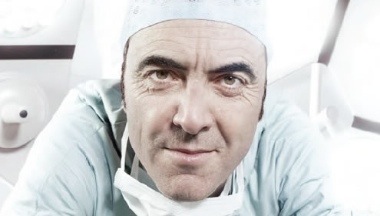Over the past 2 months, I've been caught up in the busyness of life. The pressures of balancing work, family, travel, leisure etc have meant I've failed to update this blog as regularly as I'd hoped or I would like. For this, I can only apologise and endeavour for the same to not happen again in the coming months.
 Earlier this week, I managed to make time to watch the first episode of Prime's new medical drama, Monroe. Featuring James Nesbitt as Monroe, a brilliant and unusual neuro-surgeon, it chronicles his life at hospital and at home as he seeks to deal with life or death situations and the entanglement brain injury and illness brings for all those involved.
Earlier this week, I managed to make time to watch the first episode of Prime's new medical drama, Monroe. Featuring James Nesbitt as Monroe, a brilliant and unusual neuro-surgeon, it chronicles his life at hospital and at home as he seeks to deal with life or death situations and the entanglement brain injury and illness brings for all those involved.
I'm a fan of Nesbitt and his work. I like that he hasn't sought to reinvent himself, or move from his Northern Irish roots to make himself more mainstream. The fact he is currently living in Wellington for the year, whilst filming of 'The Hobbit' takes place endears me to him even more.
I enjoyed Monroe. Again, personal reasons helped me feel this. It's filmed in Leeds, the city in which I grew up, with the hospital being set in the former Leeds Girls' High School, which was linked with the all boys' school I attended. The corridors are familiar and the surrounds are 'home'. But it was more than familiarity and sentiment that made me enjoy Monroe.
The first episode introduced Monroe, his colleagues and family - his wife, teenaged son headed away to University and his 13 year old daughter (who we don't see). Only after the plot unravels, do we discover Monroe's daughter died on the operating table whilst having a brain tumour removed. As Monroe prepares a young married woman and her husband for her brain tumour to be removed, we get a sense of the importance and value of life, and the pain of suffering. The drama's makers, ITV, clearly convey the agony and difficulty that illness, uncertainty and death bring into our lives.
After Monroe's teenaged son, Nick has left home and gone to University, he arrives home to be told by his wife Anna that she is leaving him. The decision isn't rushed, but has been considered and contemplated for six years.
As I watched Monroe, I was enveloped in the drama understanding and appreciating the dilemmas of his daily work, recognising the pressures of 21st century life, as career and family choices need to be made with implications that affect a whole raft of people.
Life today is busy. We live in a world that demands our time, energies and input. For many, we fail in different areas as the pressure of life takes it toll. For the likes of Dominique Strauss-Kahn and Anthony Wiener, the failings are very public and humiliating. For most of us, our failings are much more private and personal - the kind of things that will never hit the headlines, the things that no-one may ever or need know.
Some years ago, I read a helpful book called "Making Life Work". Using the Bible book of Proverbs, the author Bill Hybels takes the reader through the Biblical wisdom contained in that book. Today, the Bible is much maligned and mocked. However, I believe it contains much practical and sensible advice as to how to live life. Contrary to the way many view it's main character, Jesus, He was One who came to "lighten our load". He is the One who says "Come to me all who are weary and burdened, and I will give you rest." (Matthew 11:28)
As Blaise Pascal said "There is a God shaped vacuum in the heart of every man which cannot be filled by any created thing, but only by God, the Creator, made known through Jesus”. Whilst we may fill our lives with all sorts of other things, only when we allow God to fill our lives will we find the rest and fulfillment our lives long for. I'm thankful to Monroe for reminding me that in the busyness of life, we need to return to the One who brings rest.